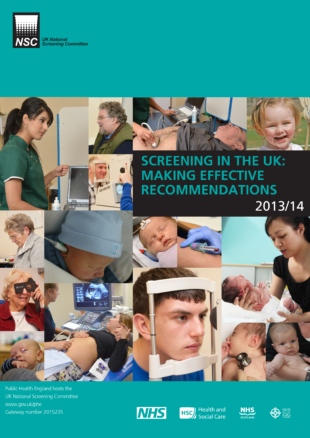The UK’s processes and standards for reviewing screening policy and making screening recommendations are recognised and respected as world leading.
We have just published the Screening in the UK: making effective decisions 2013 to 2014 report that summarises all the UK National Screening Committee’s (UK NSC’s) screening recommendations during the year.
We have a database of recommendations covering more than 100 conditions, including positive recommendations to screen for more than 30. We review each recommendation every three years using internationally recognised criteria and the best available evidence. Our recommendations then inform government screening policy decisions and guide NHS screening policy and practice.
In 2013 to 2014, we supported the continuation of screening for syphilis in pregnancy and vision defects in children but recommended against the introduction of screening for 10 other conditions. These included anal cancer, chronic obstructive pulmonary disease and placenta praevia, a complication in later pregnancy. We will reassess all of these in 2016 to 2017.
We involve a range of stakeholders in our evidence review process, including clinical experts, user representatives and patient groups. We then weigh up the potential benefits, costs and implications of introducing screening for a new condition, or making changes to an existing programme.
The UK NSC’s guiding principle is that screening should do more good than harm. More often than not we have to recommend against the introduction of a new screening programme due to a lack of evidence or evidence that, at the population level, screening could do more harm than good. For example, we recommended against the introduction of old age screening to prevent hospitalisation in 2013 to 2014. This was because a range of factors contributes to an older person being hospitalised and current tests are not accurate enough to identify clearly those at higher than normal risk. Screening could therefore lead to many older people being followed up unnecessarily and becoming unnecessarily anxious.
Introducing a new screening programme is complex and costly. That is why it is vital that we make recommendations that are cost effective in the long term. Effective screening leads to early identification and treatment. It also prevents more costly interventions further down the line, as well as saving lives and reducing the burden of disease.
Our framework and criteria for assessing screening ensures that we will continue to review all conditions in a consistent way and make good recommendations based on the best available evidence.
